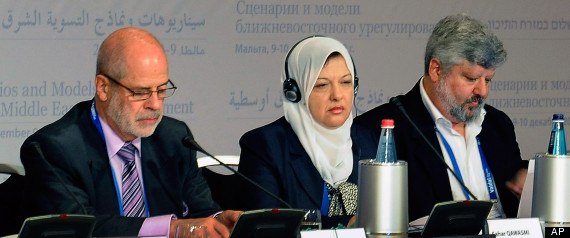
Palestinian MP Sahar Qawasmi, center, is flanked by Vitaly Naumkin, director of the Center for Arab Studies at the Institute of Oriental Studies, Russian Academy of Sciences, at left, and Gershon Baskin, Israeli Co-Director and founder of the Israel/Palestine Center for Research and Information International conference, at right, as they attend the first day of the interational summit “Scenarios and Models of the Middle East Peace Settlement”, in La Valletta, Malta, Thursday, Dec. 9, 2010. (AP Photo/Lino Arrigo Azzopardi)
Gershon Baskin joins the former Prime Minister, Foreign Minister and Foreign Intelligence Chief Yevgeny Primakov of Russia and Mikhail Margelov, chairman of the Foreign Affairs Committee and the Council of the Federation (the Russian Parliament’s upper house) at the Scenarios and Models of Middle East Settlement conference in Malta.
In early December, Secretary of State Hillary Clinton strode to the podium at Brookings’s Saban Center and elaborated on the U.S. role in the Middle East peace process—or, at least, what is left of it. But Russia beat her to the punch in discussions of that troubled region.
The night before Clinton’s talk, Russia sponsored the Second Middle East Regional Valdai Discussion Club conference. The theme of this year’s meeting (following last year’s inaugural event in Jordan)—convened in Malta—was called “Scenarios and Models of Middle East Settlement.” The discussions focused on seeking new ideas for a Middle East peace.
Moscow sent some of its biggest guns to the conference. Former Prime Minister, Foreign Minister and Foreign Intelligence Chief Yevgeny Primakov was a keynote speaker. So was Mikhail Margelov, chairman of the Foreign Affairs Committee and the Council of the Federation (the Russian Parliament’s upper house). Both men are fluent in Arabic and have decades of experience in the region.
Clearly the Kremlin would like to be the one to broker a breakthrough in the Arab-Israeli peace negotiations. It would be the brass ring for a nation intent on demonstrating its prowess at international leadership. But Moscow faces the same obstacles that stymie Washington’s progress in the Middle East: peace-process fatigue on both sides, aggravated by Palestinian and Israeli political divisions and a good dose of Arab intransigence. Despite all the goodwill in the world, the Middle East peace process remains as elusive and frustrating as ever.
Russia, although a member of the Quartet, is looking at the Middle East as a means of strengthening its own global position. As the United States and the Soviet Union competed for primacy during the Cold War, Moscow established its own set of client states, including Iraq, Syria, Libya—and the PLO. These ties still remain, as does the agenda of influence seeking, weapons sales and nuclear-technology transfers. Some participants suggested that a Russian diplomat replaces Tony Blair as the Quartet special envoy, as if such musical chair game would change much. But this is not the Middle East of the 1980s. The rise of radical Islam, Iran’s growing clout and Turkey’s ascendancy have changed the great-power dynamics.
Washington has an increasingly difficult time implementing its policies. The U.S. Middle East peace effort ran into the buzz saw of Hamas-Fatah internecine strife combined with a Palestinian inability to abandon the narrative of victimhood and vilification of Israel. Further weighing down the effort is the Arab states’ preoccupation with the Iranian threat, which leaves them largely indifferent to a peace process that could be facilitated by their cooperation.
Not that the Arab states have gone out of their way to embrace Israel. The 2002 Saudi Peace Initiative failed to acknowledge Israel’s need for border changes. Nor did King Abdullah’s initiative recognizes the need to absorb the 1948 Arab refugees and their descendants into the Arab world, as Israel has done with the Jews from Arab lands.
Over the last two decades, Israel has improved relations with Russia, which were certainly hostile during the Cold War. But the Middle East presents a maze of interests. The veteran Russian Middle East experts who gathered in Malta are torn between Moscow’s traditional support of its Arab allies, including the extremists, and what they see as promising economic and political opportunities with Israel in general, and with its Russian-speaking expatriates in particular.
Israel is home to over one million Russian speakers, about one-third of whom are ethnically non-Jewish. A visa-free travel agreement between the two nations facilitates booming tourism. Israel’s flourishing and innovative high-tech industries have also become a model for Russian modernization. Some Russian-Jewish oligarchs boast second homes in the priciest neighborhoods along the Mediterranean coast. Russia is buying Israeli drones and Gazprom is interested in developing the newly discovered gas fields off Israel’s Mediterranean coast.
Yet, these ties do not translate into Moscow pushing the Palestinians into a settlement with the Israelis. And despite Moscow’s increasingly close ties with Israel it also has deep-seated relations in the Middle East that run contrary to Israel’s security priorities. Russia has connections with Hamas, which is recognized as a terrorist organization by the U.S. State Department and the European Union. The Russian government hosted a Hamas delegation, and President Dmitry Medvedev met with its leader Khaled Meshal on a recent visit to Damascus. And unlike the United States, Russia keeps in contact with the Iranian proxy terrorist group Hezbollah. Russian anti-tank Kornet and RPG-29 rocket launchers supplied to Syria found their way into the hands of Hezbollah during the 2006 Lebanon war.
Originally Published at http://nationalinterest.org/commentary/moscow-the-middle-4621
Ariel Cohen is a senior research fellow at the Heritage Foundation and a contributing editor to The National Interest.

